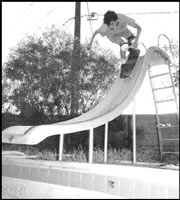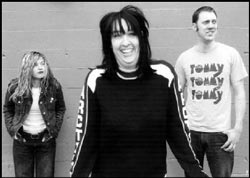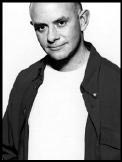HEY PUNK! III
for information, call 770-2702
runs Fri., Aug. 23-Sun., Aug. 25; JFA perform at Seattle Center Skatepark,
free, 2 p.m. Sun., Aug 25
When it comes to skateboarding, JFA singer Brian Brannon has a million stories: taking over abandoned pools; attempting near-death downhill runs; or swearing secret oaths about the location of mysterious, massive pipes. Perhaps best among his myriad tales is the one about the infamous Nude Bowl.
“It was this place on the way to Palm Springs—it used to be a nudist colony in the desert hills, but it had been abandoned for decades and people would come skate all the time,” recalls Brannon. “We’d have parties up there; there’d be like 300 people with a generator in the middle of nowhere. You could play as loud as you want, skate in the pool. It was great.”
Like all good things, the Nude Bowl eventually caught the attention of the authorities, who quickly decided to fill it—then, ultimately, blow it apart, but not before the spot would enjoy a brief rebirth.
“They filled it up with dirt,” Brannon says, “but we got a backhoe and drove it up there and dug it all out, put in new coping, patched all the holes, repainted it, and basically it was kinda . . . reborn.” It’s a moment celebrated as sun-kissed memory in one of JFA’s latest songs, “Nude Bowl Resurrection.”
For Brannon, leader of a group Rolling Stone once dubbed “the premier skate-rock band of all time,” the past few years have been akin to watching a similar resurrection, as traditional vert skating has made a massive comeback—aided in part by the historical appraisals of authors like Glen E. Friedman and Michael Brooke and, more prominently, Stacy Peralta’s big-screen documentary Dogtown and Z-Boys.
“It’s kinda been going on even before the movie hit—it really started with all the new skate parks they’ve been building over the last few years,” says Brannon, of the sport’s old-school renaissance.
“It was already rolling in that direction, and guys were coming out of the woodwork—the ones who’d gotten left behind with the whole street skating thing. A lot of the power pool skaters couldn’t adopt to that [style] or didn’t care to. With the skate parks coming back, they’ve all come out again. Old-style guys—Eddie Elguera, Chris Strople. And then the Dogtown thing has brought all the stragglers, too; all the people who were out of it are getting back with it.”
JFA, too, is getting back with it after an extended layoff. The band—founded in Arizona in ’81—recently celebrated its 20th anniversary, but has spent the better part of the past year on hiatus, sidelined with what Brannon describes as “serious drummer problems.”
In addition to being JFA’s first show since their appearance at last year’s Hey Punk! festival, the group’s upcoming Experience Music Project-sponsored gig will also double as the debut of new trapsman Matt Etheridge, a vet of several prominent NoCal outfits including Los Olividados, Drunk Injuns, and Hemi. (Etheridge joins original JFA members Brannon and guitarist Don Redondo, plus bassist Bruce Taylor, on board since ’89.)
Despite the live layoff, the band did make it into the studio during the break. JFA’s latest recording, Concrete Waves, is a three-band split CD from Duane Peters’ Disaster Records label. (“He’s a longtime hero to the band, says Brannon of the legendary U.S. Bombs/Hunns frontman, “and now he’s our skate buddy,”) Waves, which also features contributions from the Worthless and Blue Collar Special, is fashioned along the lines of another classic punk collection, 1979’s Beach Blvd.
The album marks JFA’s first recorded appearance since their 1999 Hurricane Records full-length Only Live Once—which itself was the band’s first significant offering since their 1988 Placebo Records swan song, Nowhere Blossoms. Even though JFA releases have been, at best, sporadic, word of mouth and a certain aura—this is a band, after all, that had its own line of boards in the ’80s—have kept them a touchstone for new generations of skate punks.
“I get e-mails all the time from kids wanting us to play benefits for skate parks or pools out in the middle of nowhere,” says Brannon. “We love to do that. How can you refuse when some kid calls you up and says, ‘Dude, there’s gonna be four kegs and a pool and we’re gonna have lights set up, and it’ll be great!'”
In keeping with the old-school theme, Brannon says he’s been urging his bandmates to dip into the back catalog and promises that the EMP set will feature most, if not all, of the songs from the group’s seminal Blatant Localism EP.
“It’s fast and intense, and it’s what people want,” says Brannon of classic cuts like the anti- hippie tirade “Beach Blanket Bong Out,” the malnutrition manifesto “Cokes and Snickers,” and their signature, “Jodie Foster’s Army.”
“When we first started, we played [hard and fast]; then everybody started playing like that, and so we got into some weirder stuff because we didn’t want to be like everyone else,” he says of the band’s incorporation of acoustic guitar, keyboards, and various other progressive elements. “But now, people are playing all different kinds of things, so we can go back to the old style.”
Reminiscing about the band’s halcyon days in Arizona’s sun-scorched clime, the conversation eventually leads to JFA’s Evergreen State connection. The band’s onetime label benefactor, Placebo Records head Tony Victor, owns a local Seattle ticket agency, while JFA’s old Phoenix running buddies the Sun City Girls have called the Emerald City home for a decade. “I’d love to see all those guys again,” says Brannon of his onetime tour- and labelmates.
Like the Sun City crew, Brannon and JFA packed up and left Arizona at the beginning of the ’90s. After a run as music editor at Bay Area skate bible Thrasher magazine, Brannon settled south with the rest of the group in Huntington Beach, Calif., where he currently writes for the Seal Beach Sun, and, along with original JFA bassist Michael Cornelius, maintains a Web site dedicated to their dual passions, www.skaterock.com.
Having been witness to boarding’s various mutations and remarkable growth through the years, Brannon is still surprised at the mainstream acceptance of what was once considered a delinquent’s pastime. He marvels, especially, as skate-punk music is increasingly embraced in otherwise unusual settings, like, say, a museum, for example.
“It’s so incredible. I mean, especially considering what we had to go through when we were coming up—people driving by in Camaros yelling ‘Devo!’ at us and throwing beer bottles at our heads. [Nowadays}, we’re being invited to play in Seattle at Paul Allen’s museum. Things have really changed.
“But it’s great for us, cause they treat us really well—they fly us out there, feed us, put us up in a hotel, all that. Of course,” he laughs, “you don’t want to be treated too well—then it’s not really punk anymore.”









